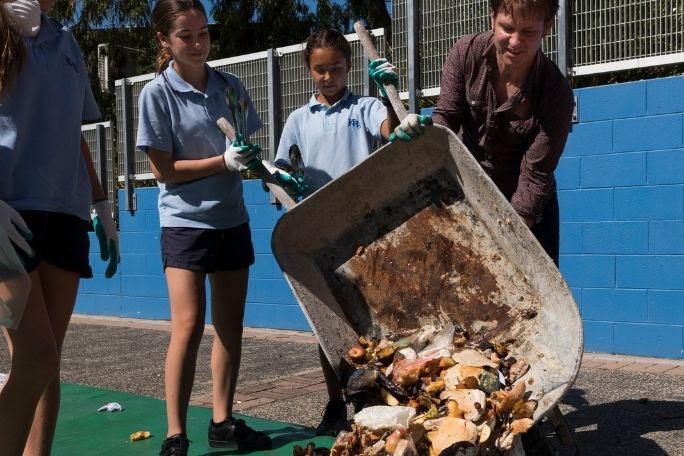Lesson summary
Students explore the topic of food waste. They begin by working collaboratively to define food waste and look at some of the different sources of food waste and reasons for wasting food. They then work individually or collaboratively to conduct an inquiry into the environmental costs of food waste; they will do this by developing an inquiry question on this topic and then conducting the research necessary to answer their question. Students prepare a presentation to share the results of their inquiry with the class. Students can use their learning from the lesson as the basis for the follow-up social action lesson.
Learning intentions:
Students will...
- understand what food waste is
- understand some of the different sources of food waste and the reasons why we waste food
- recognise some of the environmental costs of food waste.
Success criteria:
Students can...
- develop an inquiry question and plan an inquiry around this question
- gather and analyse data
- produce a presentation to share the results of their inquiry
- work collaboratively and independently
- participate in group and class discussions.
Lesson guides and printables
Lesson details
Curriculum mapping
Australian curriculum content descriptions:
Year 9 Geography:
- Challenges to food production, including land and water degradation, shortage of fresh water, competing land uses, and climate change, for Australia and other areas of the world (ACHGK063)
- Develop geographically significant questions and plan an inquiry that identifies and applies appropriate geographical methodologies and concepts (ACHGS063)
- Evaluate sources for their reliability, bias and usefulness and select, collect, record and organise relevant geographical data and information, using ethical protocols, from a range of appropriate primary and secondary sources (ACHGS064)
- Apply geographical concepts to synthesise information from various sources and draw conclusions based on the analysis of data and information, taking into account alternative points of view (ACHGS068)
- Present findings, arguments and explanations in a range of appropriate communication forms, selected for their effectiveness and to suit audience and purpose; using relevant geographical terminology, and digital technologies as appropriate (ACHGS070)
Year 10 Geography:
- Human-induced environmental changes that challenge sustainability (ACHGK070)
- Develop geographically significant questions and plan an inquiry that identifies and applies appropriate geographical methodologies and concepts (ACHGS072)
- Evaluate sources for their reliability, bias and usefulness and select, collect, record and organise relevant geographical data and information, using ethical protocols, from a range of appropriate primary and secondary sources (ACHGS073)
- Apply geographical concepts to synthesise information from various sources and draw conclusions based on the analysis of data and information, taking into account alternative points of view (ACHGS077)
- Present findings, arguments and explanations in a range of appropriate communication forms, selected for their effectiveness and to suit audience and purpose; using relevant geographical terminology, and digital technologies as appropriate (ACHGS079)
Syllabus outcomes: GE5-2, GE5-3, GE5-5, GE5-7, GE5-8.
General capabilities: Critical and Creative Thinking.
Cross-curriculum priority: Sustainability OI.3, OI.8.
Relevant parts of Year 9 Geography achievement standards: Students analyse interconnections between people, places and environments. They use initial research to identify geographically significant questions to frame an inquiry. They evaluate a range of primary and secondary sources to select and collect relevant and reliable geographical information and data. Students synthesise data and information to draw reasoned conclusions. They present findings, arguments and explanations using relevant geographical terminology and digital representations in a range of appropriate communication forms.
Relevant parts of Year 10 Geography achievement standards: Students identify, analyse and explain significant interconnections between people, places and environments and explain changes that result from these interconnections and their consequences. They use initial research to develop and modify geographically significant questions to frame an inquiry. They critically evaluate a range of primary and secondary sources to select and collect relevant, reliable and unbiased geographical information and data. They analyse and synthesise data and other information to draw reasoned conclusions. Students present findings, arguments and explanations using relevant geographical terminology and graphic representations and digital technologies in a range of selected and appropriate communication forms.
Unit of work: War On Waste – Years 7-10
Time required: 100+ mins
Level of teacher scaffolding: Medium – oversee activities and facilitate class discussions
Resources required
- Device with internet and presenting capability
- Presentation Rubric
- Student Worksheet – one copy per student
- Year 9 Worksheet
- Year 10 Worksheet
Skills
This lesson is designed to build students’ competencies in the following skills:
- Collaboration
- Communication
- Creativity
- Critical thinking
Additional info
Cool Australia’s War On Waste lessons have been developed in partnership with Lune Media and with support from the Australian Environmental Grantmakers Network. These lessons have been designed to lead students through a deeper understanding of some of the big issues relating to waste in Australia and to support them to take action to reduce the impact of waste on our environment.


Welcome back!
Don't have an account yet?
Log in with:
By signing up to Cool.org you consent and agree to Cool's privacy policy to
store, manage and process your personal information. To read more, please see
our privacy policy here(Opens in new tab).
Create your free Cool.org account.
Many of our resources are free, with an option to upgrade to Cool+ for premium content.
Already have an account?
Sign up with:
By signing up to Cool.org you consent and agree to Cool's privacy policy to
store, manage and process your personal information. To read more, please see
our privacy policy here(Opens in new tab).